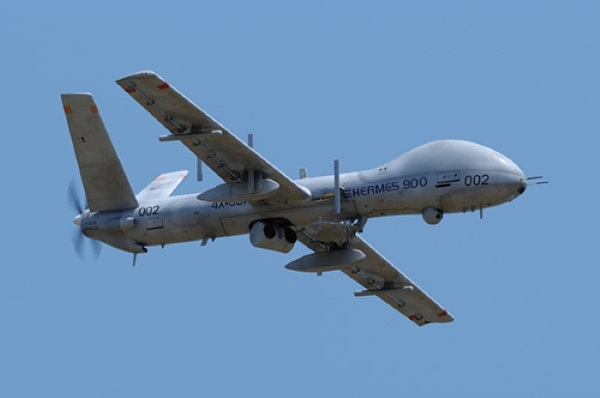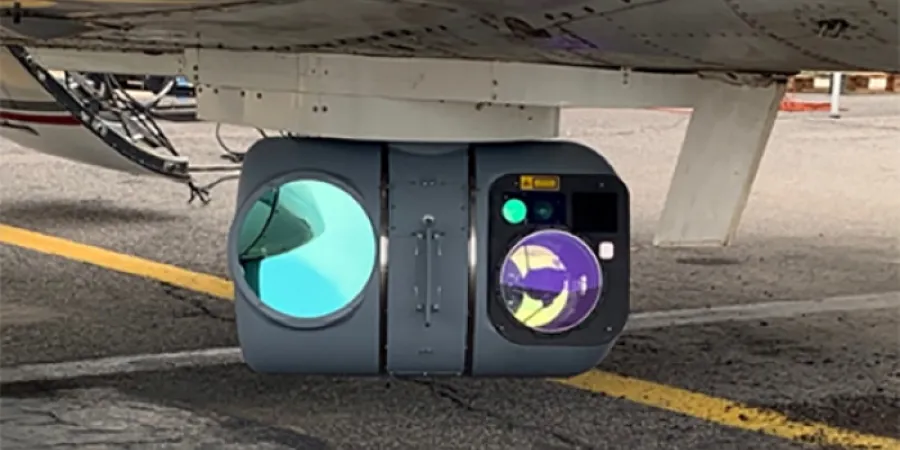Elbit introduces AMPS NG long-range target detection, recognition system
The latest version of Elbit's AMPS includes shortwave infrared technology for overcoming high humidity, smoke or dust. A European Air Force is said to be in the final stages of testing the AMPS NG
Eyal Boguslavsky
|
11/03/2021
Israel's Elbit Systems unveiled Wednesday the next generation of its Advanced Multi-Sensor Payload System, the AMPS NG, which detects and recognizes targets at extremely long ranges. The new system, Elbit said, adds shortwave infrared (SWIR) technology to the existing day CCD (Charge-Coupled Device) TV sensors and a unique highly capable dual FLIR sensor design.
According to the company, the AMPS NG, packed in the widely fielded two line-replacement unit (LRU) AMPS pod, offers extended capabilities in all conditions, dramatically extending observation performance in limited visibility conditions, using its SWIR channel to effectively overcome high humidity, smoke or dust.
Elbit said in its announcement that in recent flight tests conducted in Israel, the new system was able to produce high resolution imagery of a football game in the MWIR channel from a distance of 25km, and aerial target tracking of a Hermes 900 drone in the SWIR channel from dozens of kilometers away. The AMPS NG is fully qualified for operations in extreme operational conditions, and a European Air Force is in the final stages of testing the system with an unmanned aircraft, according to the company.
Similar to the legacy AMPS, the new system is optimized to enhance and increase the throughput of target intelligence production which is facilitated by autonomous navigation with an inertial system and GPS, as well as highly accurate geo-pointing and geo-location capabilities. The AMPS NG is also suitable for a range of airborne intelligence stand-off and stand-in mission profiles and is ideal for use of both manned as well as unmanned aircraft, Elbit said.

Photo: Elbit
The latest version of Elbit's AMPS includes shortwave infrared technology for overcoming high humidity, smoke or dust. A European Air Force is said to be in the final stages of testing the AMPS NG
Israel's Elbit Systems unveiled Wednesday the next generation of its Advanced Multi-Sensor Payload System, the AMPS NG, which detects and recognizes targets at extremely long ranges. The new system, Elbit said, adds shortwave infrared (SWIR) technology to the existing day CCD (Charge-Coupled Device) TV sensors and a unique highly capable dual FLIR sensor design.
According to the company, the AMPS NG, packed in the widely fielded two line-replacement unit (LRU) AMPS pod, offers extended capabilities in all conditions, dramatically extending observation performance in limited visibility conditions, using its SWIR channel to effectively overcome high humidity, smoke or dust.
Elbit said in its announcement that in recent flight tests conducted in Israel, the new system was able to produce high resolution imagery of a football game in the MWIR channel from a distance of 25km, and aerial target tracking of a Hermes 900 drone in the SWIR channel from dozens of kilometers away. The AMPS NG is fully qualified for operations in extreme operational conditions, and a European Air Force is in the final stages of testing the system with an unmanned aircraft, according to the company.
Similar to the legacy AMPS, the new system is optimized to enhance and increase the throughput of target intelligence production which is facilitated by autonomous navigation with an inertial system and GPS, as well as highly accurate geo-pointing and geo-location capabilities. The AMPS NG is also suitable for a range of airborne intelligence stand-off and stand-in mission profiles and is ideal for use of both manned as well as unmanned aircraft, Elbit said.

Photo: Elbit



